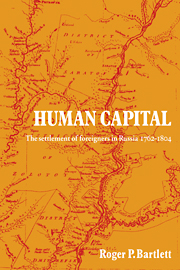Book contents
- Frontmatter
- Contents
- Weights and measures
- Abbreviations
- Preface
- Introduction
- I Antecedents
- 2 Catherine II and the Manifestos of 1762 and 1763
- 3 The response: settlement 1763–1775
- 4 Southern Russia 1764—1796
- 5 Urban and entrepreneurial settlement under the 1763 Manifesto
- 6 Immigration and colonies 1797–1804
- Conclusion
- Appendices
- Notes
- Bibliography
- Index
- Frontmatter
- Contents
- Weights and measures
- Abbreviations
- Preface
- Introduction
- I Antecedents
- 2 Catherine II and the Manifestos of 1762 and 1763
- 3 The response: settlement 1763–1775
- 4 Southern Russia 1764—1796
- 5 Urban and entrepreneurial settlement under the 1763 Manifesto
- 6 Immigration and colonies 1797–1804
- Conclusion
- Appendices
- Notes
- Bibliography
- Index
Summary
General patterns of settlement in eighteenth–century Russia: Orenburg Province
The first large–scale settlement under Catherine's policies took place on the lower Volga around Saratov. At that time this was still frontier territory. During the seventeenth century, Muscovite control over the relatively empty lands around the old Muscovite centre had advanced rapidly. In the south, the political boundaries and the frontier of settlement had reached the lands of the Zaporozhian and Don Cossacks, and close confrontation with the Turks and their Crimean Tatar vassals. The middle Volga region and the lands to the west of it were now relatively secure: on the Don and in Voronezh province the land was being settled by noble landowners (pomeshchiki) and the limits of the Don Cossack territories defined. Further south and east, however, the situation was less settled. East of the Volga the Bashkirs, and further south the Kirgiz and the Kalmyk, grazed their flocks and herds over vast, almost empty spaces. On the right (western) bank, the towns established in the sixteenth century remained relatively isolated points of settlement and the land southwards was open to attack by freebooters and brigands, or by the Crimean and Kuban Tatars, as successive defence lines built across the southern Ukraine and as far as the Volga testify. The Tatar threat faded progressively through the eighteenth century, but was only finally eliminated with the annexation of the Crimea and the Kuban in 1783.
- Type
- Chapter
- Information
- Human CapitalThe Settlement of Foreigners in Russia 1762–1804, pp. 5 - 30Publisher: Cambridge University PressPrint publication year: 1979



